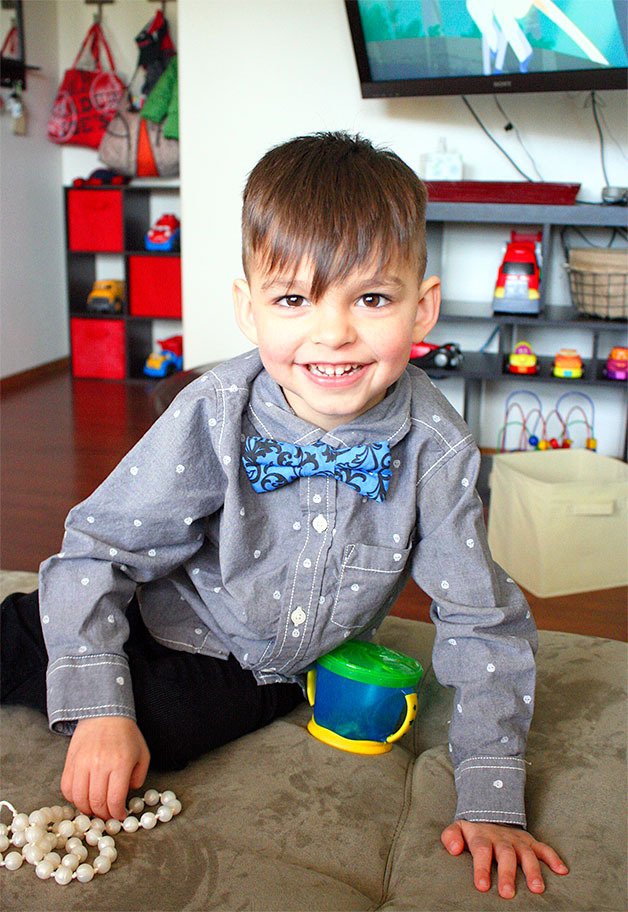On his first night home from the hospital, Erin Stuart noticed something was wrong with her son, Liam.
With a background in early childhood development, Stuart found Liam’s cluster of symptoms troubling. Liam was screaming nonstop, becoming rigid, wasn’t latching and hated being swaddled.
Stuart thought, “I know I’m a new mom, but something just doesn’t feel right.”
Three years after that long, frustrating night, Stuart and her husband, Rob, have come a long way with Liam, who was diagnosed with autism within his first year and received help through the state-funded Toddler Learning Center.
Catching the symptoms early and beginning therapy in the first three years is key.
“Seventy-five percent of the brain is developed in the first three years,” said Rene Denman, executive director of the Toddler Learning Center.
“The more you can work with them in the first three years, the better.”
When physical testing yielded nothing wrong with Liam initially, doctors followed up with some sensory testing at six months and the Stuarts were encouraged to seek developmental therapy.
“That was a scary call to make,” Stuart said.
When Liam finally got his diagnosis, it was a turning point for the Stuarts.
“When we got the diagnosis it was a relief for us,” Stuart said. “It put us on the path to getting the therapy he needed.”
Stuart’s husband, Rob, went on deployment five months after Liam was born but was home in time to take Liam for a swallow study, for which the boy had to be restrained.
“That was probably the most heartbreaking thing I’ve had to do with him,” Rob Stuart said. “He was screaming and crying, and I was trying not to cry.”
Because the “wires were crossed in his brain” instinctual infant behaviors were difficult, Stuart said. Swallowing became gagging, attempting to grasp caused his hands to spread out, sitting became laying rigid.
Starting with feeding, the Stuarts learned how to retrain their son through sensory exercises. Once swallowing was down, they moved on to other developmental problems like sitting, crawling and grasping.
“As an outside person, you wonder, ‘Is this really going to do anything?’ ” Stuart said.
But the therapy did yield results over time.
“Every time we addressed his sensory needs, he would go from doing nothing to excelling,” Stuart said. “What’s great about TLC is they come into your home and teach you the techniques you can use when they aren’t around.”
With her husband frequently on deployment, Stuart has had to shoulder a lot of the parenting burden in his absence.
“It’s been really hard on her,” Rob Stuart said.
Stuart said she had a breakdown at around six weeks after his birth, out of frustration.
“It’s hard when you don’t understand your child,” Stuart said. “He was inconsolable. Thank goodness Rob is so supportive.”
“He didn’t sleep a lot, which meant we didn’t sleep a lot,” Rob Stuart said. “It was crazy.”
Now at three years old, Liam can eat — and does eat — just about anything and behaves largely like a typical child. Originally diagnosed as nonverbal, Liam is now speaking at the level of a 4- to 5-year-old.
Academically, Liam doesn’t qualify for special education because he tested too high and will be going to a community preschool.
Despite his progress, Liam still struggles with emotional and social situations. Meltdowns still occur, but the Stuarts have learned to avoid triggers when possible.
“Autism doesn’t go away,” Stuart said. “It’s not something that you grow out of.”
However, people with autism can learn coping skills to help them be as typical as possible.
Stuart uses her experience to help advocate for early childhood programs like the Toddler Learning Center through the State Interagency Coordinating Council for Infants and Toddlers with Disabilities and their Families. Stuart was in Olympia just last week meeting with legislators and their staff to advocate for funding for programs like the Toddler Learning Center.
“I think it made the biggest difference,” Stuart said. “I don’t think he’d be doing as well had we not caught it early. If he was diagnosed later, it would be totally different.”
Denman said the Toddler Learning Center, which has been around for 30 years, typically serves around 75 children in Island County with a variety of developmental issues. Families can be referred by their doctor or self-refer if they have concerns.
The center screened 338 children in the county last year.
“Our hope is that parents know their rights, know about their child’s developmental needs and they feel they have the skill set to help their child grow,” Denman said.
For information about Toddler Learning Center, visit www.oakharbortlc.weebly.com



